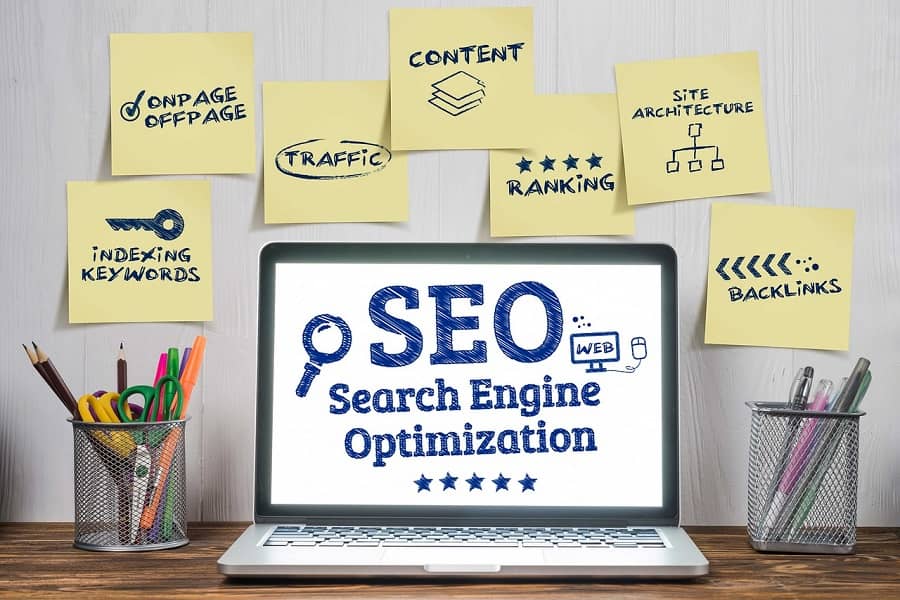Understanding off-page SEO (Search Engine Optimization) is like deciphering a hidden code to web success.
Just as chefs need to source quality ingredients, your website needs high-quality backlinks, social media shares, and other off-site activities to rank high in SERPs (search engine results pages).
But why is it so essential, and how can you leverage it effectively?
Packed with specific examples and actionable strategies, this guide will help you unravel the mystery.
So, are you ready to unlock the power of off-page SEO?
Let’s begin!

What is Off-Page SEO?
Off-page SEO, as the name suggests, encompasses all the activities that you and others do away from your website to raise the ranking of your page with search engines.
It’s like a popularity contest where the more high-quality endorsements or links you have from other websites, the more favorably search engines view your page.
Yet, it’s not just about backlinks, though. It also involves your promotional methods and the ways people perceive your brand on the web.
Imagine you’ve thrown a party.
Your on-page SEO would be the party decorations and appetizers — everything under your control within your house.
Off-page SEO would be the guests talking about your fantastic party to their friends, helping to enhance your reputation and encouraging more people to attend future parties you host.
Makes sense?
Let’s consider a more practical application…
Consider you’re writing a blog post. You’ll include relevant keywords (on-page SEO).
But, how do you ensure people see your blog?
Off-page SEO.
You might reach out to other bloggers or influencers for a shoutout or share your blog post on social media. Maybe you’ll answer related questions on Quora and drop your blog post link.
Why is Off-Page SEO Essential?

To further understand the significance of off-page SEO, let’s dive deeper into the numerous compelling reasons why mastering off-page SEO can transform your online presence into a shining beacon in the vast sea of digital content…
Higher Rankings
Think of search engines as discerning food critics. They love websites with a strong reputation, much like how critics are drawn to restaurants with a stellar standing in the culinary world.
The more quality backlinks you garner, the more positive brand mentions you receive, the higher your web page can climb on the search engine results page — akin to how a restaurant’s reputation is elevated by excellent reviews and word-of-mouth praise.
Greater Visibility
Being on the first page of Google’s search results is like having your shop on the busiest street in town. It leads to more visibility and consequently, more organic traffic.
Ask yourself, how often do you wander into the quieter lanes when the main street is teeming with the best shops?
Similarly, the chances of your website being visited drop significantly if it’s not on the first page of search results.
Increased Authority
Quality backlinks from high-authority websites function like seals of approval.
They signal to search engines that your content is not just valuable, but also dependable.
This boosts your domain and page authority, effectively giving your site a louder voice in the bustling conversation of your industry.
Boost Brand Awareness
Imagine your brand’s name being mentioned on influential blogs, or your guest post appearing on popular platforms. It’s like having a billboard in Times Square, enhancing your brand’s reach and recognition.
The more your brand is noticed, the more it will be remembered.
Improved Trustworthiness
Trust plays a crucial role in winning customers in the digital sphere.
Just as one trusts a product recommended by a friend, positive customer reviews on your Google Business Profile or other review sites can significantly increase trust in your brand, influencing local SEO.
10 Top Off-Page SEO Tips That’ll Elevate Your Digital Marketing Strategy

Ready to turn up the heat on your off-page SEO strategy? Here are 10 actionable tips to supercharge your efforts…
1. Quality Backlinks
Quality backlinks are the cornerstone of off-page SEO. A backlink is a link from one website to another, and search engines like Google view them as votes of confidence.
However, not all backlinks are created equal.
High-quality backlinks come from reputable, authoritative sites and are earned naturally through superior content.
For instance, if an influential tech blog links to your article about the latest smartphone trends, that’s a high-quality backlink.
Remember, a few great backlinks can do more for your SEO than hundreds of low-quality ones.
Network with influencers in your field, write guest posts for well-known blogs, and create link-worthy content to get these prized backlinks.
2. Content Marketing
The backbone of off-page SEO is indeed quality content.
Creating content that others want to link to, share on social media, or mention in their blogs will naturally boost your SEO.
But what makes content share-worthy?
It needs to be relevant, engaging, and provide value to the reader.
For example, if you’re in the digital marketing space, you could create comprehensive guides on latest marketing trends, video tutorials explaining complex topics, or case studies showcasing your success stories.
Always remember, content that educates, inspires or entertains is more likely to be shared and mentioned across the web.
3. Guest Posting
Guest posting is not just about earning backlinks; it’s an opportunity to tap into a wider audience, showcase your expertise, and drive traffic back to your website.
For example, if you run a nutrition blog, guest posting on a popular health and wellness site can attract a new cohort of fitness enthusiasts to your content.
To maximize the benefits, always tailor your posts to the host site’s audience, and make sure to include a link back to your website in your author bio.
Reach out to blogs that align with your niche, pitch compelling topics, and write posts that offer real value.
4. Social Media Engagement
A well-curated social media presence can amplify your off-page SEO efforts by encouraging more external sites to link to your content.
For instance, if you share an insightful blog post on Twitter and it goes viral, others may link to it in their own content.
While social signals like likes, shares, and follows don’t directly impact search rankings, they increase your online visibility and enhance your brand reputation.
Make your content easily shareable on social media, engage in meaningful conversations with your followers, and use social listening tools to monitor brand mentions and respond promptly.
5. Influencer Marketing

Collaborating with influencers can help you reach larger and more diverse audiences, driving traffic to your site and building trust in your brand.
For instance, if a famous food blogger posts a recipe using your kitchen gadget with a link to your site, you get a high-quality backlink plus access to their passionate foodie followers.
Remember, choose influencers whose values align with your brand and who have genuine engagement with their followers.
An influencer’s endorsement can be perceived as a trusted recommendation, providing a significant SEO and credibility boost.
6. Brand Mentions
Even if a brand mention doesn’t include a link, it can still contribute to your off-page SEO.
Google’s algorithm considers brand mentions as “implied links” that signify your brand’s authority.
For example, if a popular podcast discusses your unique approach to remote work, it raises your company’s profile even without a physical link.
Encourage positive brand mentions by consistently putting out quality content, maintaining strong customer service, and building meaningful relationships with your audience.
The more your brand is positively mentioned, the more search engines perceive you as a trustworthy authority.
7. Google My Business
In the world of local SEO, an optimized Google My Business profile is non-negotiable. It’s your digital storefront, helping customers find, learn about, and interact with your business.
Regular updates about your services, operation hours, and customer engagement can significantly boost your local ranking.
So, reply to reviews — both positive and negative — to show your commitment to customer satisfaction.
Also, add high-quality photos to make your profile more engaging.
Businesses with 101+ photos receive a greater number of requests, clicks, and driving directions to their location from users on Google.
8. User-Generated Content
Encouraging customer reviews or user-generated content on social platforms can boost your brand’s trustworthiness. It’s a powerful tool that can make your brand more relatable and authentic.
For instance, run a social media contest where customers post photos of themselves using your product or service.
Not only will this increase engagement, but these user testimonials can also serve as valuable social proof, indirectly benefitting your SEO.
9. Social Bookmarking Sites
Leveraging social bookmarking sites can help you gain exposure. They work like online bulletin boards where users can save and share links to their favorite content.
But be cautious — each community has its unique culture and rules.
Make sure your content fits the community’s interest to avoid looking spammy.
10. Forum Engagement

Participate in forums like Quora or industry-specific message boards.
By providing value and answering questions related to your niche, you can establish yourself as a trusted expert and generate some traffic back to your site.
For instance, if you’re a fitness trainer, you could answer questions about workout routines or nutrition advice, ensuring to include a subtle reference to your website or blog, but always keeping the main focus on providing value to the community.
Sealing the Deal with Off-Page SEO
Remember, there’s no silver bullet for off-page SEO success.
It requires persistence, creativity, and a little elbow grease.
But the rewards?
Well, they’re as sweet as seeing your website sitting pretty on that coveted first page of search results.
The post What is Off-Page SEO? & Why You Need it in 2023 (+ Tips) appeared first on Smart Blogger.

No comments:
Post a Comment